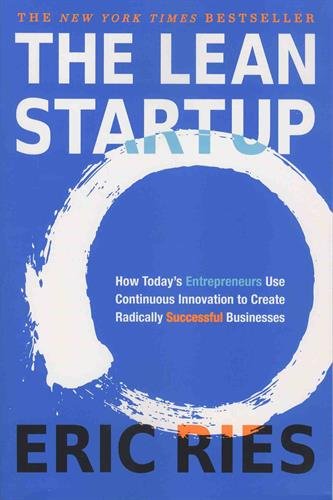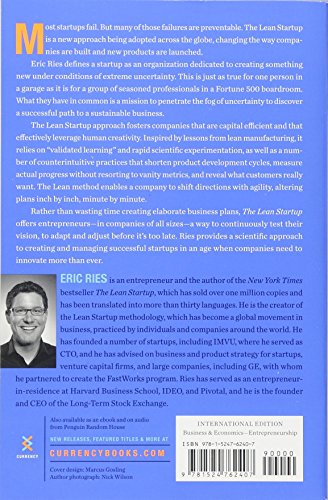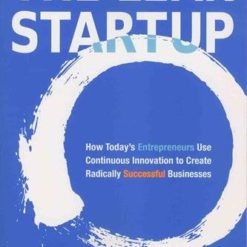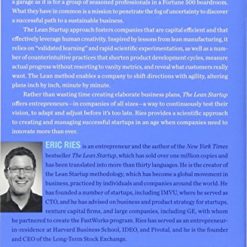Auteur: Ries, Eric
Nombre de pages: 336
Éditeur: Currency
Date de sortie: 17-10-2017
Détails: Présentation de l’éditeur Most startups fail. But many of those failures are preventable. The Lean Startup is a new approach being adopted across the globe, changing the way companies are built and new products are launched. Eric Ries defines a startup as an organization dedicated to creating something new under conditions of extreme uncertainty. This is just as true for one person in a garage or a group of seasoned professionals in a Fortune 500 boardroom. What they have in common is a mission to penetrate that fog of uncertainty to discover a successful path to a sustainable business. The Lean Startup approach fosters companies that are both more capital efficient and that leverage human creativity more effectively. Inspired by lessons from lean manufacturing, it relies on “validated learning,” rapid scientific experimentation, as well as a number of counter-intuitive practices that shorten product development cycles, measure actual progress without resorting to vanity metrics, and learn what customers really want. It enables a company to shift directions with agility, altering plans inch by inch, minute by minute. Rather than wasting time creating elaborate business plans, The Lean Startup offers entrepreneurs—in companies of all sizes—a way to test their vision continuously, to adapt and adjust before it’s too late. Ries provides a scientific approach to creating and managing successful startups in a age when companies need to innovate more than ever. Extrait Part One VISION 1 START ENTREPRENEURIAL MANAGEMENT Building a startup is an exercise in institution building; thus, it necessarily involves management. This often comes as a surprise to aspiring entrepreneurs, because their associations with these two words are so diametrically opposed. Entrepreneurs are rightly wary of implementing traditional management practices early on in a startup, afraid that they will invite bureaucracy or stifle creativity. Entrepreneurs have been trying to fit the square peg of their unique problems into the round hole of general management for decades. Asa result, many entrepreneurs take a « just do it » attitude, avoiding all forms of management, process, and discipline. Unfortunately, this approach leads to chaos more often than it does to success. I should know: my first startup failures were all of this kind (as we saw in the Introduction). The tremendous success of general management over the last century has provided unprecedented material abundance, but those management principles are ill suited to handle the chaos and uncertainty that startups must face. + + + I believe that entrepreneurship requires a managerial discipline to harness the tremendous entrepreneurial opportunity we have been given. There are more entrepreneurs operating today than at any previous time in history. This has been made possible by dramatic changes inthe global economy. To site but one example, one often hears commentators lament the loss of manufacturing jobs in the United States over the previous two decades, but one rarely hears about a corresponding loss of manufacturing capability. That’s because total manufacturing output in the United States is increasing (by 15 percent in the last decade) even as jobs continue to be lost (see the charts below). In effect, the huge productivity increases made possible by modern management and technology have created more productive capacity than firms know what to do with.1 We are living through an unprecedented worldwide entrepreneurial renaissance, but this opportunity is laced with peril. Because we lack a coherent management paradigm for new innovative ventures, we’re throwing our excess capacity around with wild abandon. Despite this lack of rigor, we are finding some ways to make money, but for every success there are far too many failures: products pulled from shelves mere weeks after being launched, high-profile startups lauded in the press and forgotten a few months later, and new products that wind up being
Soyez le premier à laisser votre avis sur “The Lean Startup: How Today’s Entrepreneurs Use Continuous Innovation to Create Radically Successful Businesses” Annuler la réponse
Vous devez être connecté pour publier un avis.
























Avis
Il n’y a pas encore d’avis.